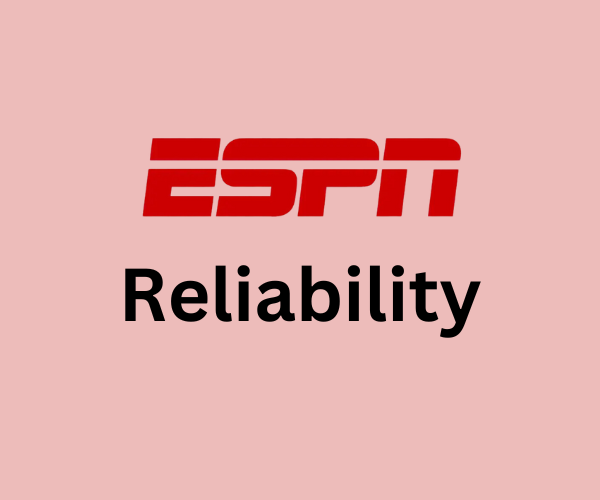
It’s quite interesting that ESPN allows readers to submit corrections to their stories, if someone feels as though an aspect of it is incorrect or misrepresented. Their website states the following:
“At ESPN, our reputation and credibility with viewers, readers and listeners are of paramount concern. While our goal is always to be accurate and fair, occasionally we will present an erroneous assertion of fact. Significant errors of fact will be corrected in a clear and timely manner, with appropriate prominence.”
Why is this important? It offers insight into the network’s reliability– though much is yet to be explored. Considering this commitment to transparency and accuracy, in addition to information that will soon follow about ESPN’s reliability, it can be determined that they’re relatively reliable, as far as sports networks go.
It’s worth noting that ESPN is owned by Disney– who also owns ABC– a network that’s known in part for its liberal leanings.
Does Reliability Matter?
Reliability, in general, refers to how trustworthy or accurate information, or in this case, a news source is. If we consider this definition, it quickly becomes clear why reliability is important in media sources. If we can’t trust the things we read then there isn’t much of a point in continuing to consume content from that source, after all. So how exactly can we gauge the reliability of a news source anyways?
There are several potential measures of reliability to look out for when trying to determine whether a media source is reliable or not. Red flags for an unreliable article can include the presence of wild unsubstantiated claims, facts dependent on other unreliable sources, heavy use of opinionated language, and more. Some indicators of a reliable news source, on the other hand, include things like:
- Absence of subjective/opinionated language in articles
- Credible sources cited (e.g., neutral sources, .gov, .edu websites)
- Facts and statistics backed by multiple relevant outside sources
- Use of primary sources when possible (e.g., interviews, quotes)
- Information that remains consistent across news sources
So How Does ESPN Fare in its Reliability?
The political reliability index developed by Biasly objectively assesses news organizations’ accuracy and trustworthiness. ESPN’s overall Reliability Score has been rated as ‘Fair’ by Biasly.
ESPN’s Fact Analysis Score is N/A, as Biasly’s analysts have not rated the facts in the news source to this point other than what is found in this article in lower sections
ESPN’s Source Analysis Score is ‘Fair,’ meaning there’s less concern to be had about the individual sources ESPN choses to use in their writing or coverage. Readers can trust some– if not most– of the sources provided. This score, which is based on A.I., focuses on assessing the quality of sources and quotes used including their number, lengths, uniqueness, and diversity.
However, since these scores are based on percentages and averages, individual articles could be more or less trustworthy depending on the context, author, and other factors. It can be determined that ESPN does have their occasional struggles with reliability, but the statement referenced in the first paragraph of this piece highlights their commitment to correcting unreliable statements or references.
Let’s analyze the supporting data for ESPN’s rankings.
ESPN Accuracy and Reliability
The credibility of news organizations is significantly impacted by bias and political orientation. ESPN is occasionally accused of having left-leaning bias. We can look into the honesty of their news stories and determine how well the network supports their assertions with evidence to see whether or not this frequent claim of bias is valid. We will check for selection and omission bias as we assess the articles’ overall factuality.
Selection bias is when stories and facts are selected or deselected, often on ideological grounds, to create a narrative in support of the new sources’ ideology. Omission bias, on the other hand, is when different opinions and political views regarding a situation are left out so that the reader is only exposed to the ideological perspective supported by the author. It’s important to keep in mind these two types of biases when trying to assess an article’s level of accuracy. These types will be further explored later on.
Biasly assigns a percentage score for each article’s accuracy, with one (1) being the least accurate and one hundred (100) being the most. Ratings are calculated by evaluating claims with supporting evidence, the amount of reliable internal sources, and the number of reliable external sources used. A full page at Biasly’s website includes dependability and accuracy ratings for ESPN articles.
ESPN’s overall reliability is ‘Fair,’ but this can vary from article to article. For example– one article, entitled “Bakole stuns rising heavyweight Anderson by KO,” has a reliability rating of ‘Fair,’ while another article, entitled “2024 Olympic Gymnastics Trials: Live Updates as the Team is Finalized,” has a reliability rating of ‘Poor.’ This demonstrates the challenge of pigeonholing ESPN’s articles on the basis of reliability. While one article may demonstrate very poor reliability, that of another article could be near perfect. ESPN’s content is not a monolith– some stories are relatively unreliable, while others can be completely trusted.
One notable issue with Biasly’s assessment of ESPN’s content– as it pertains to their reliability– is the general absence of reliability scores with articles that cover political or social issues. The reliability scores previously discussed all correspond to articles that steer clear of such issues. As a result, there could be a skewed sense of reliability that’s either more or less fair than it is in reality amongst ESPN’s content.
Articles like “Ukraine’s Top Club Want Iran Out of World Cup” and “Massachusetts Gov. Baker Picked to Lead NCAA” cover inherently political topics, but don’t have reliability ratings. Because of this, ESPN’s overall reliability rating should be taken with a grain of salt when considering its relation to political pieces.
Analysis of Reliability in ESPN’s Online News Articles
ESPN’s online news articles– as expressed by the network themselves– aim to inform readers without influencing their opinions. Some outlets proudly claim ideological bias, but ESPN does not. Nonetheless, accusations of left-leaning biases have been leveled against the network. This prompts a closer look into their reliability on an article-to-article basis.
As mentioned previously– ESPN has few articles that cover politics, so there are only so many to explore for this. Take a look at a few different excerpts from a story entitled “Sources: NBA, union plan to paint ‘Black Lives Matter’ on courts in Orlando.”
“The NBA and National Basketball Players Association are planning to paint “Black Lives Matter” on the court inside both sidelines in all three arenas the league will use at the Walt Disney World Resort when it resumes the 2019-20 season late next month in Orlando, Florida, league sources told ESPN.
The WNBA is also discussing painting “Black Lives Matter” on the court when it begins its abbreviated 2020 season at the IMG Academy in Bradenton, Florida, sources said.”
The frequent use of “sources” in this article might raise some eyebrows. Who are these sources? Are they trustworthy? How can we be sure, one way or the other? Articles like this one that deal with political or social issues while failing to properly cite sources create uncertainty and weaken the networks overall reputation with reliability.
Quality of Sources and Facts Used
One thing that’s important to consider when looking at source citations in an article is the quality of those sources being used. In some cases, like the article referenced above, ESPN struggles to cite legitimate sources and creates a sense of murkiness with their assertions.
However, in other cases, ESPN is quite good at naming their sources and using ones that tend to be reliable. Just look at the sources cited in one article found on their website, entitled “At least 10 wounded in Denver shooting after Nuggets win NBA title.”
- Denver police
- Police Chief Ron Thomas
- Police Spokesperson Doug Schepman
- Reuters
- The Associated Press
“Information from The Associated Press and Reuters was used in this report.”
This expansive list indicates a higher reliability than the past article referenced. There is broad diversity amongst these sources– some are first hand witnesses, others are officials, and the rest are credible news outlets. The ESPN article also combines statistics and facts from these outlets with quotes and analysis from the people interviewed.
The more credible and cited sources an author uses, the more reliable their work may be. Compare and contrast this article with other work where the author isn’t as clear about sources, and you will likely notice a difference.
Selection and Omission Bias
Many articles that ESPN puts out balance sources and inputs quite well, leading to no major selection or omission bias. For example– the article “World Series champion Nationals celebrated by Trump at White House” touches on the Nationals World Series win in 2019, while still (subtly) noting the political turmoil then-President Trump faced at the time.
Additionally, they simultaneously highlighted the excitement that some Nationals players had to go see Trump and the decision that others made to skip the visit. In this article, both pro-Trump and anti-Trump perspectives are considered, with all sides of the issue put on display.
“Amid an impeachment inquiry on Capitol Hill and Washington feting its first Major League Baseball champion since 1924, Trump hugged Kurt Suzuki after the catcher put on a ‘Make America Great Again’ hat.”
In another ESPN article, entitled “Donald Trump says Warriors not welcome at White House,” we see selection and omission bias in action. This article covers the same concept as the previously-assessed article, but in a different way. ESPN seeks to highlight the Golden State Warriors’ dissatisfaction with Trump as President and their decision not to visit the White House. They fail, however, to give any light to President Trump’s perspective, or the perspective of anyone on the Warriors that would’ve been interested in attending the White House event.
ESPN sticks to one side of the story throughout the entire article, only using anti-Trump quotes and drawing attention to opposition sentiment.
“My stance is the same as it was [Friday],” Curry said Saturday. “And even kind of cemented even further about how things in our country are going, especially with [Trump] representing us in a very damaging way.” – Steph Curry
“We would, in normal times, very easily be able to set aside political differences and go visit and have a great time,” Kerr said. “That’ll be awesome. But these are not ordinary times. Probably the most divisive times in my life, I guess, since Vietnam.” – Steve Kerr
“He’s now using sports as the platform to try to divide us. We all know how much sports brings us together. … It’s not something I can be quiet about.” – LeBron James
The author is selecting quotes that express anti-Trump sentiment, while omiting those that share other perspectives– specifically Trump’s perspective or that of pro-Trump Warriors players. This is ultimately what selection and omission bias leads to: a lopsided story that seems to bring more light to one perspective than the other.
ESPN doesn’t seem to struggle frequently with this bias, but there are examples of their authors falling victim to it nonetheless. Overall, selection and omission bias doesn’t occur enough to play a major role in ESPN’s overall reliability.
So, Is ESPN Reliable?
Let us recall that ESPN’s reliability rating is ‘Fair,’ meaning that the network is in fact– overall– fairly reliable. We have now explored the complexities of reliability and recognize our limited scope of judgment for this aspect of the network’s writing and coverage. The general absence of reliability scores with articles that cover political or social issues could create a skewed sense of reliability that’s either more or less fair than it is in reality amongst ESPN’s content.
Nonetheless, from what we currently understand via Biasly’s A.I. technology, it’s not a stretch to call ESPN fairly reliable. Their rating suggests that they generally are, and there are no notably unreliable sources used by the network– or articles that lack sources altogether– to contradict this. Through our assessment, it has been determined that ESPN is fairly reliable.




























